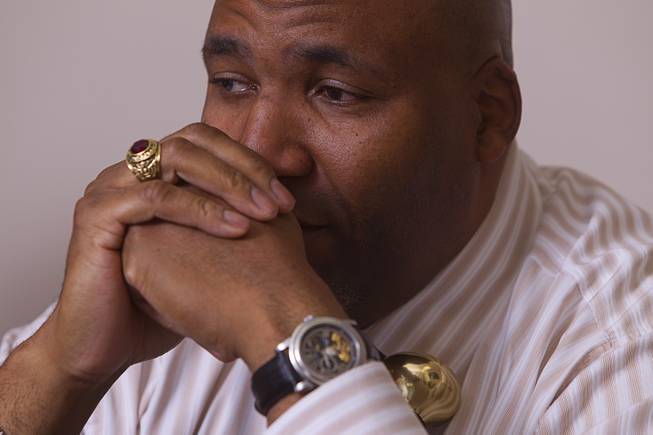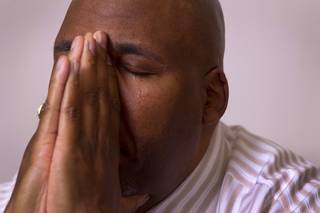
Rudy Gibson remembers his younger brother Stanley during an interview in his attorney’s office in Henderson Thursday, Feb. 21, 2013. Stanley Gibson was killed in an officer-involved shooting in December of 2011.
Sunday, Feb. 24, 2013 | 2 a.m.
For more
- How we got here: The drama and legal challenges that led to police fatality reviews
- Grand jury refuses to indict cop who killed unarmed veteran (Dec. 19, 2012)
- Commission shelves coroner’s inquests for new ‘police fatality review process’ (Jan. 7, 2013)
- Source: Metro blames police radio for officer firing on unarmed veteran (Nov. 9, 2012)
In the 14 months since Stanley Gibson was shot and killed by Metro Police officers, Gibson’s family has struggled with unanswered questions.
What was Gibson, a 43-year-old Gulf War veteran allegedly suffering from post-traumatic stress disorder, doing out of the house that fateful December night when police approached him, his older brother Rudy asks. Why did a plan to remove Gibson from his vehicle with beanbag rounds and pepper spray end with him being shot seven times by police officer Jesus Arevalo? And why were police in such a hurry to end the standoff with the unarmed Gibson, whose vehicle was boxed in between two patrol cars?
“Why not give him another half an hour? The car wasn’t going to fly anywhere,” Rudy Gibson said. “I’ve been running that in my mind over and over and over again. It doesn’t make any sense. … This never should have happened.”
The family’s quest for understanding has yielded lots of closed doors but few answers.
•••
In December, a grand jury declined to indict Arevalo after evidence was presented during hearings closed to the public and Gibson’s family.
Some of the questions surrounding Gibson’s case could be answered Thursday during the first Police Fatality Public Factfinding Review Panel, a new iteration of the controversial coroner’s inquests into fatal officer-involved shootings. Still, Rudy Gibson isn’t optimistic.
“We hope something will happen, but we know nothing’s going to happen,” Gibson said.
His comments echo much of the skepticism surrounding the revamped process.
The last inquest was in 2010 before legal challenges derailed the process. Those legal wranglings, in turn, prompted Clark County Commissioners to make changes in January aimed at getting the hearings back on track.
Along with the new name, the hearings have been moved out of courtrooms and into the county commission chambers to take them out of a judicial setting. Gone is the panel of pseudo-jurors that heard cases and issued rulings on whether a shooting was justified.
Instead, the process has been pared down to include three key people: a hearing officer (for the Gibson case, it's retired judge Stewart Bell) who will preside over the proceedings; a prosecutor from the district attorney’s office who will present the facts of the case and call witnesses; and an ombudsman representing the interests of the family and the public who is allowed question witnesses, but not call any of his or her own.
Commissioner Steve Sisolak said the changes were intended to make the hearings less adversarial and promote the dissemination of information to the public.
“We’re going to get the District Attorney’s office to opine why they didn’t choose to file charges in this case,” Sisolak said. “The public will have more access to information.”
During the hearing, the prosecutor will present the evidence collected by the District Attorney’s office and call witnesses who can either make a presentation of facts or answer questions.
•••
It is unclear what new information, if any, will be presented about what happened when Stanley Gibson was killed on Dec. 12, 2011.
According to police reports, officers were responding to a burglary call at a northwest valley condominium near Smoke Ranch Road and Rainbow Boulevard when they encountered Gibson.
After being approached by police, Gibson – reportedly disoriented and distraught – refused to surrender and allegedly rammed his white Cadillac into a patrol car.
Officers used two patrol cars to box in Gibson’s car, pinning him there for more than an hour. When Gibson continued to try to drive away and ignored police orders, officers developed a plan to use a beanbag round fired from a shotgun to break a window on Gibson’s car and then fill the cabin with pepper spray, forcing him out.
When the beanbag round was fired, Arevalo fired seven live rounds from his rifle, striking and killing Gibson.
Police have attributed the shooting to a miscommunication caused by a radio failure.
Rudy Gibson said his brother, a Las Vegas native and graduate of Eldorado High School, was disabled because of cancer and suffered from severe anxiety from his days serving in the Gulf War. He worked as a cook but also helped bury the dead bodies of the enemy — a task Rudy Gibson said haunted his brother.
Sisolak described the review hearing, which will be broadcast live on television and on the Internet, as a presentation of facts that will allow the public to make its own opinions about the case.
He said he planned to attend the hearing and use feedback from the public to see if any changes to the process need to be made.
“I’m going to ask everybody to go in with an open mind and see what the strengths are and what the weaknesses are,” he said. “I don’t know if I’ll agree with the district attorney’s decision or not until I see the evidence that’s presented.”
Allen Lichtenstein, general counsel for the American Civil Liberties Union of Nevada, called the police fatality review process a "glorified press conference" when commissioners approved it in early January. He hasn't changed his mind since.
Lichtenstein said the new setup essentially takes eyewitness testimony out of the equation, creating a situation that isn't conducive to shedding light on the facts.
"What we've basically lost is all the information that would have and should have come out about how things progressed to that terrible point," he said.
Lichtenstein said he worried information about possible procedural mistakes, for instance, might not be made public, weakening the transparency of the review.
At the least, he hopes officers' Garrity-protected statements — meaning statements officers gave the department immediately after the incidents that cannot be used against them criminally — will become a part of the fact-finding review.
•••
Rudy Gibson said he planned to be at the hearing with his mother and older sister. A younger sister is still unsure whether she will attend, Rudy Gibson said.
Once the hearing is done, the Gibsons hope they’ll find the answers they’re seeking through a civil suit filed by Stanley’s mother, Celeste Gibson, against Metro Police and several officers.
Rudy Gibson says all the family wants is for someone to be held accountable for the shooting.
“You go out to (Stanley’s) grave and there’s a guy on his left born in 1927. The guy on his right was born in 1931. (Stanley) was born in 1968,” Rudy Gibson said. “You do the math and you realize how much time that minute police couldn’t wait any longer took from him. They took that. You can’t give that back.”


Join the Discussion:
Check this out for a full explanation of our conversion to the LiveFyre commenting system and instructions on how to sign up for an account.
Full comments policy